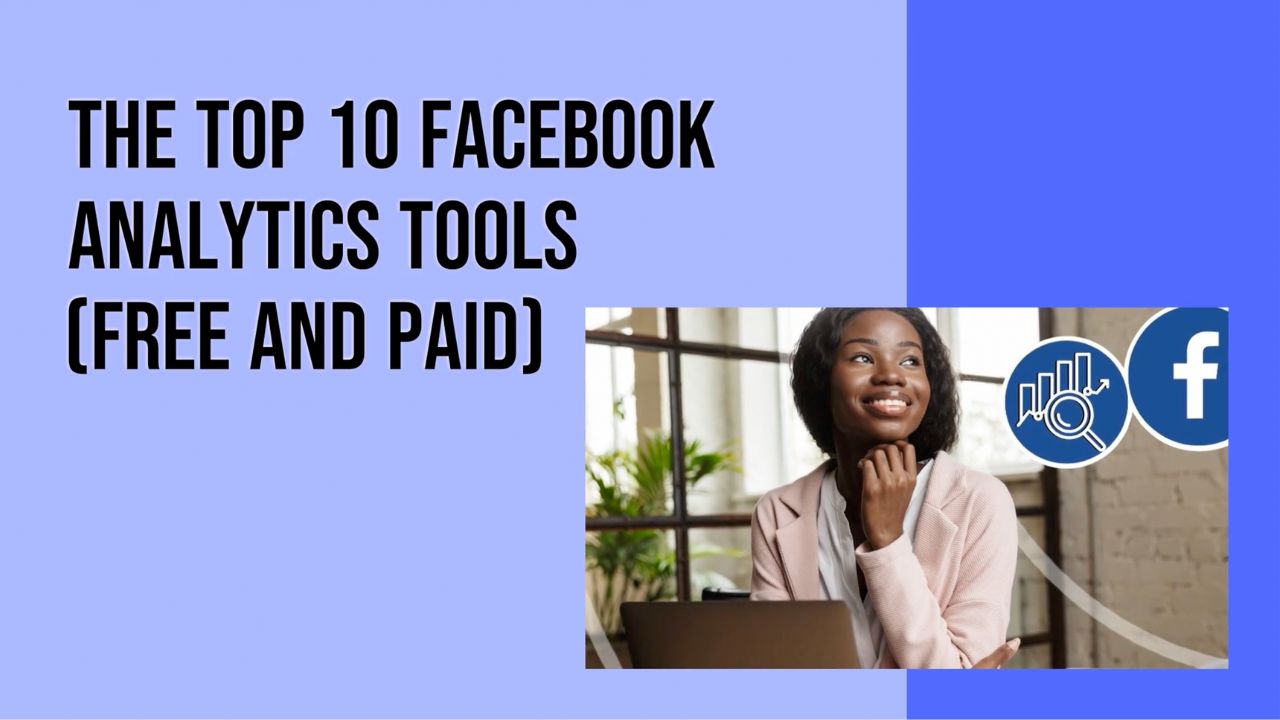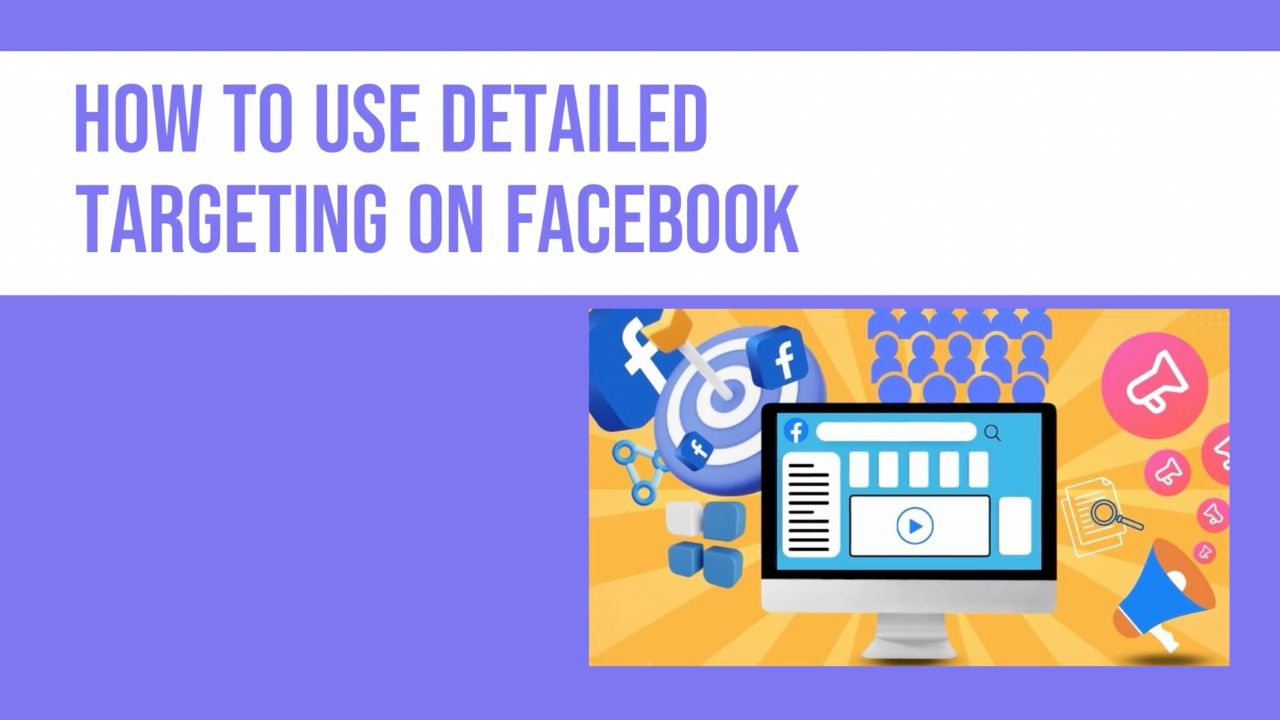Want to improve the performance of your Facebook Page? Unsure where to start?
Facebook analytics tools enable you to:
- Better understand your audience
- Measure your Page’s performance
- Monitor your competition
- Enable easy access to analytics data for your team
... And generally improve performance!
This post shares:
- The benefits of using a Facebook analytics tool
- The types of data such tools have access to
- 10 top Facebook analytics tools across a range of budgets, including completely free
Let's start with a key question...
Why Might You Need a Facebook Analytics Tool?
Perhaps you’re wondering why you might need a Facebook analytics tool in the first place.
Here are some of the reasons why you might want to consider using one:
Understanding Your Audience
By giving you insights about your audience such as demographic information (for example, gender, age, location, income range, and so on), you know both who you’re talking to and the type of content that might resonate with them more strongly.
Or of course you might discover you’re attracting the wrong crowd completely, and need to pivot the type of content you post.
Want to improve the performance of your Facebook Page? Facebook analytics tools (including third-party software) help measure what's happening and identify opportunities for improvement.Click To Post OnMeasuring Performance
By measuring and monitoring key metrics for your Facebook Page, you can see exactly how it’s performing and fine tune your approach accordingly.
This becomes even more important when running paid ads on Facebook. Analytics tools help show you how your campaigns are performing, enabling you to optimize them effectively and improve your ROI.
Monitoring Your Competition
As well as allowing you to analyze your own Facebook Page, analytics tools can provide important insights on competitor’s Pages too, such as the type of content they produce and engagement rates.
You can then use this information to inform your own strategy and help you gain a competitive advantage.
Providing Wider Data Access
If you only use Facebook’s analytics tools (see #1 below), this will be restricted to those provided with the relevant permissions in Facebook.
Third-party tools can help make the data available to other stakeholders and members of your team.
What Types of Data Do Facebook Analytics Tools Access?
Page Performance Metrics
This includes engagement metrics such as:
- Likes
- Shares
- Page views
- Followers
- Comments
Ad Performance Metrics
Metrics include click-through rates, conversion rates, costs per click, reach and engagement metrics with ads such as likes and shares.
Audience Demographics
Common demographic information includes age, gender, location, marital status, income range and interests.
Competitor Metrics
This might include metrics relating to engagement levels on competitor Facebook Pages, performance of their ad campaigns, and general insights into their marketing strategy on Facebook.
Using a Facebook analytics tool helps you better understand your audience, measure your performance, monitor your competition, and facilitate data sharing within your team.Click To Post On10 Top Facebook Analytics Tools
1. Facebook — Meta Business Suite Insights and Facebook Page Insights
First stop has to be Facebook itself, giving you free access to data on your Page’s performance.
Some basic Facebook analytics is available directly from your Page. Just click Insights from the Manage Page menu.
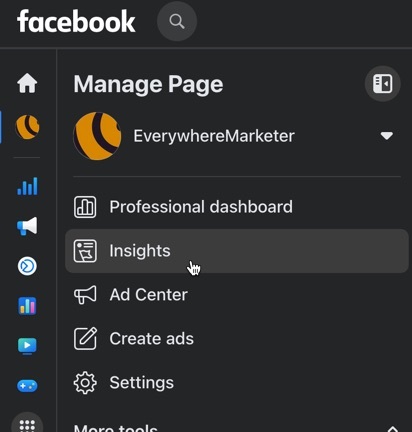
Don’t expect anything too in-depth, but it does give you a basic overview of Page performance for the past 28 days, which you can keep monitored.
For example, you can see metrics such as:
- The size of your audience…
- Audience demographics such as age, gender and location…
- Post reach and engagement levels
For more in-depth metrics, you need the Insights tool from within Meta Business Suite.
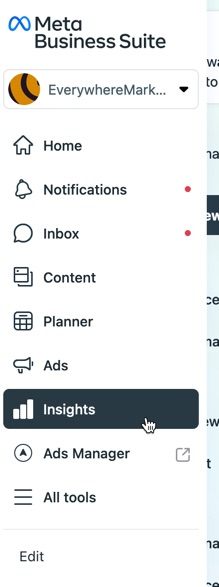
If you don’t see Insights on the menu, click Edit and then select Insights via the popup. It should then appear.
With the Insights tool in Business Suite, you can see your data over a customizable, and potentially much longer period of time, with more detailed information, including graphs that show how it has changed over time.
Because it’s Meta, you can see information related to your Instagram profile in the same tool.
Data includes:
- Facebook Page reach
- Page and profile visits
- New likes and follows
- Ad trends
- More detailed audience demographics
- Competitive data relating to similar businesses (via the Benchmarking feature)
- An overview of content performance, and comparative post performance data
- Video engagement data
2. Fanpage Karma
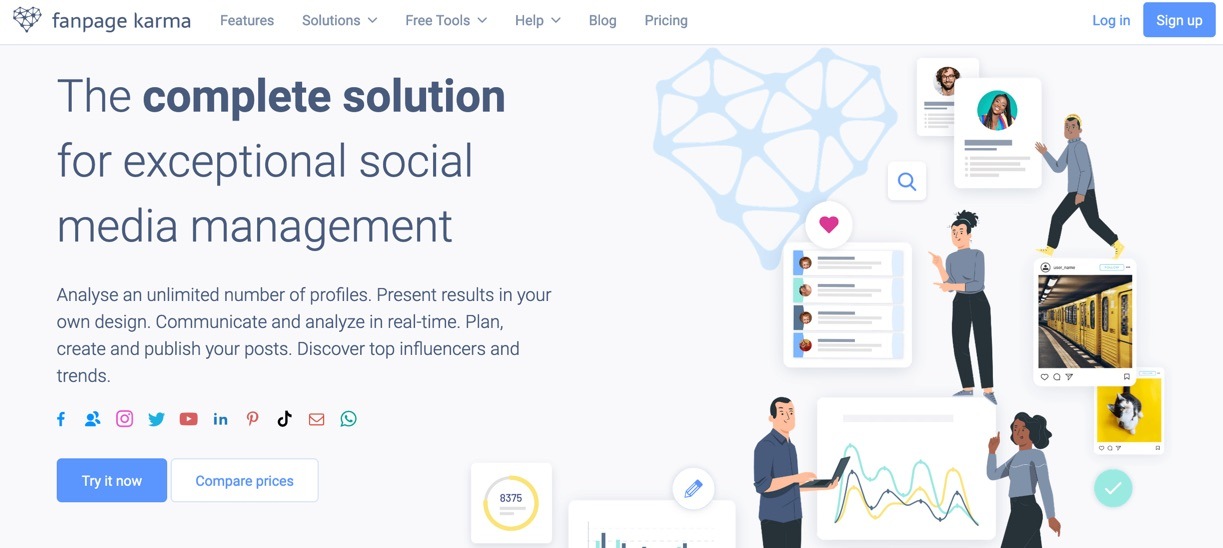
This tool offers a range of features to help analyze and optimize your Facebook Page.
To get started, you can use it for free with a single Facebook Page and explore some of the basic analytics functionality the tool has to offer.
With an upgraded paid subscription, you can start to monitor competitor Pages by adding any number of additional profiles, retrieve data over a longer time period, and unlock other functionality beyond analytics such as scheduling and publishing content.
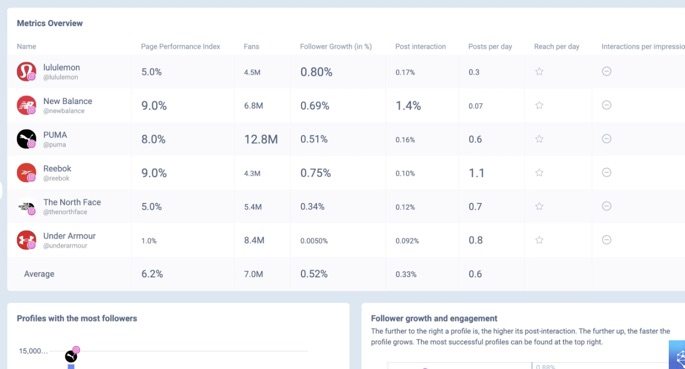
It’s analytics capability includes:
- Reporting—create downloadable, customizable reports for Excel, PowerPoint or CSV, including updated reports sent automatically via email, and a range of chart types…
- Analytics—claims to use more than 350 metrics, with analyses based on factors such as hashtags, content and key figures…
- Email alerts—including for important events, relevant topics and trends, and configurable regular reports
3. Iconosquare
![]()
Iconosquare is a paid tool (with a 14-day no credit card free trial) that allows you to connect multiple social media accounts, including of course Facebook, for analytics, reporting, and additional features such as social listening.
Features include the ability to create a custom dashboard that shows the metrics you want to monitor, along with automated email reports.
![]()
Data can also be exported as visual graphs, such as to incorporate into presentations.
As well as monitoring your own Facebook analytics, you can do the same for competitors, including the ability to schedule regular emailed reports.
4. BuzzSumo
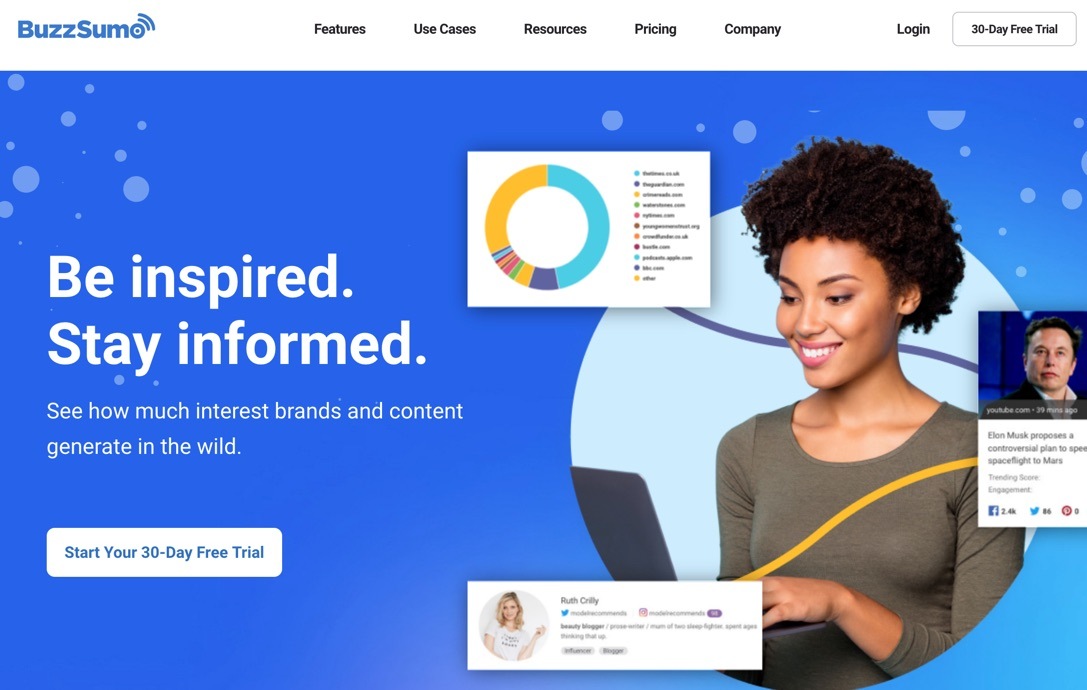
BuzzSumo is better known for its content marketing features, but they also provide Facebook analytics tools for their Suite and Enterprise plan users.
Features include the ability to compare posts and engagement levels, and get other insights, across multiple different Pages, and discover potentially thousands of Pages related to a particular keyword.
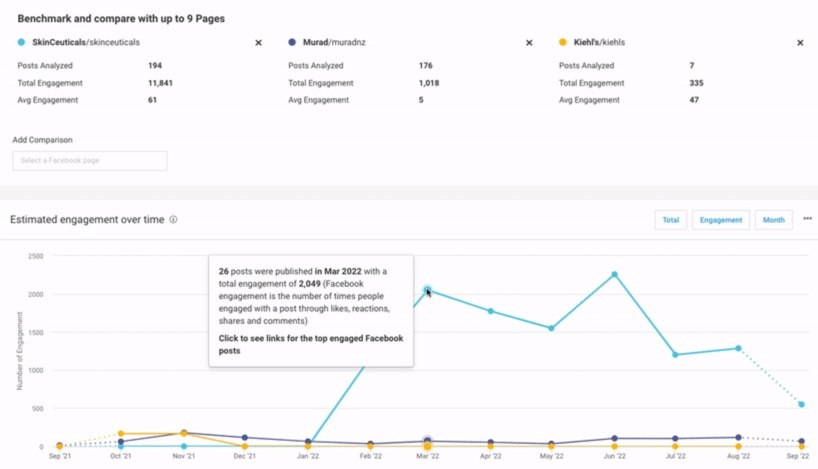
Performance reports include data such as:
- Number of posts, engagements and average engagement levels within a particular time window
- Post and engagement trends over time
- Average engagement per post type and character range
- Campaign performance reports
A particularly valuable feature is the ability to see the time periods when your audience is most engaged, across potentially multiple Pages that also serve your audience, so you know optimal times to publish.
Plus you can spot potential content gaps where you can provide content and content types your audience is actively engaging with, but which are currently in short supply.
5. AgoraPulse
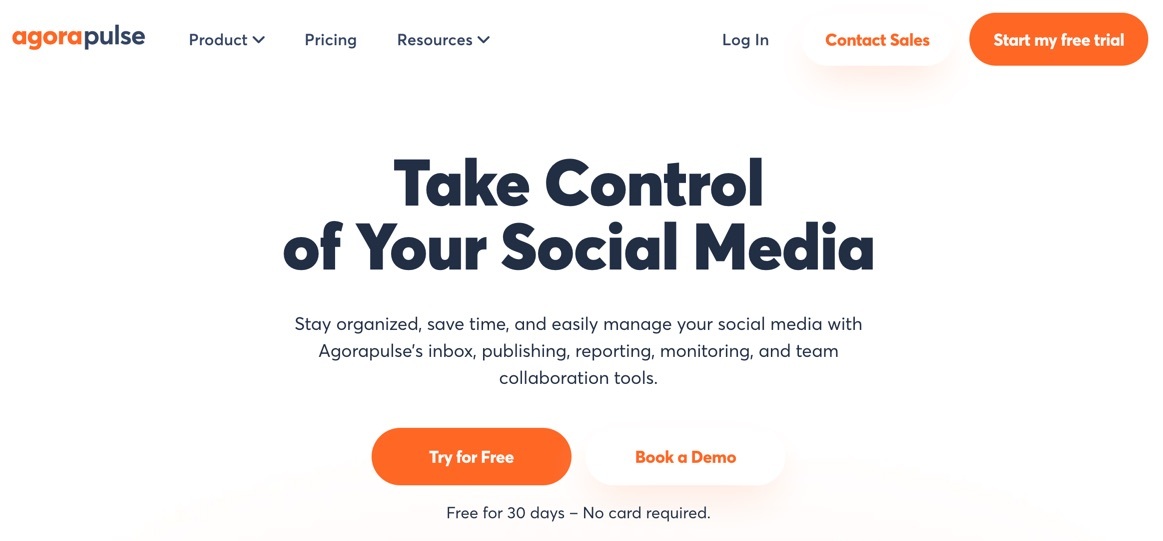
AgoraPulse provides a range of social media management features, such as a cross-platform social inbox, content scheduling, and analytics for Facebook and other platforms.
Its analytics features include an analytics dashboard showing metrics such as organic and paid reach, clicks and engaged user data.
[Tracking engagement on Facebook using AgoraPulse tracking-engagement-agorapulse.jpg]
You can create custom reports based on the metrics and time period you need, including comparative reports for different time periods, and scheduled automated email reports.
The software also allows you to track competitor performance on Facebook.
6. Sprout Social
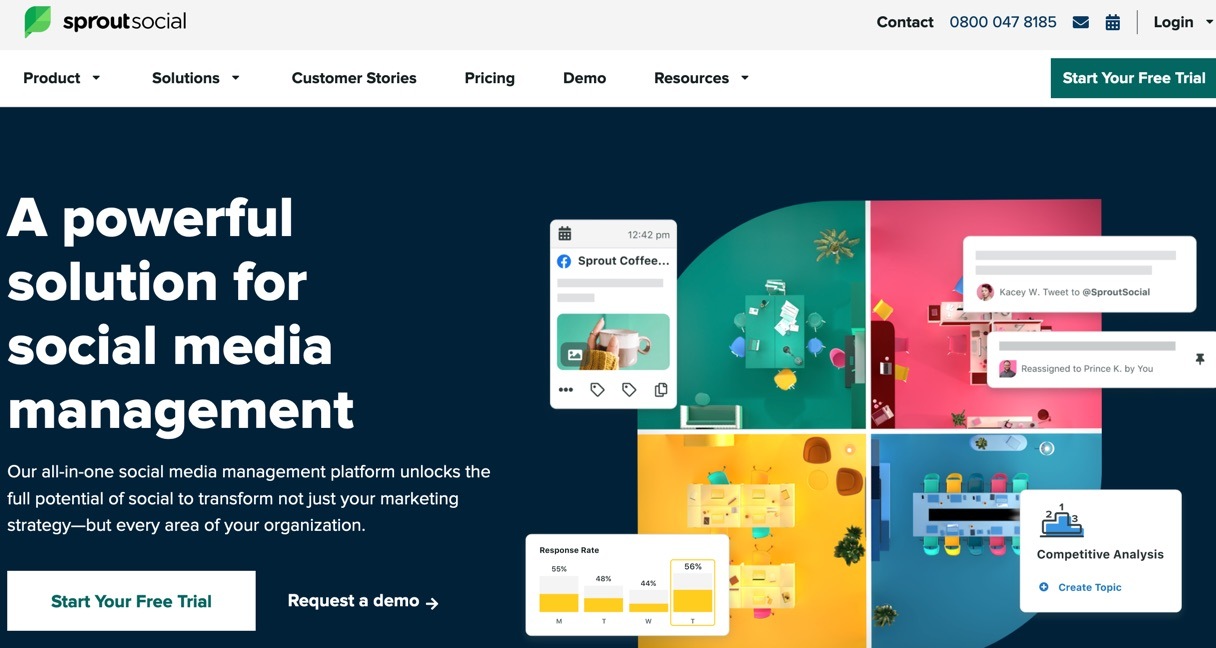
Sprout Social is a comprehensive social media management tool that provides analytics across multiple different platforms including Facebook.
For Facebook specifically, you can track metrics such as Page impressions, follower growth and the performance of paid and organic content.
Customizable reports allow you to see visualizations of trends and current behavior, and compare data from different time periods.
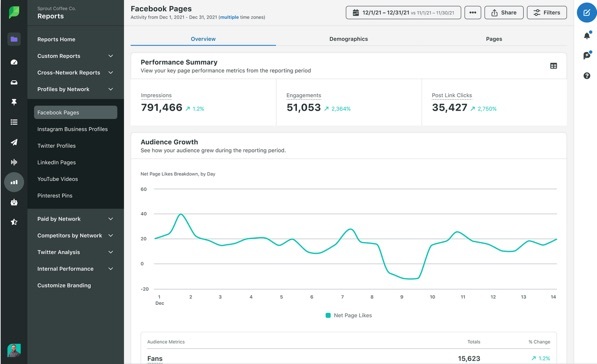
You can also compare and benchmark your own Page against those of competitors.
7. Brandwatch
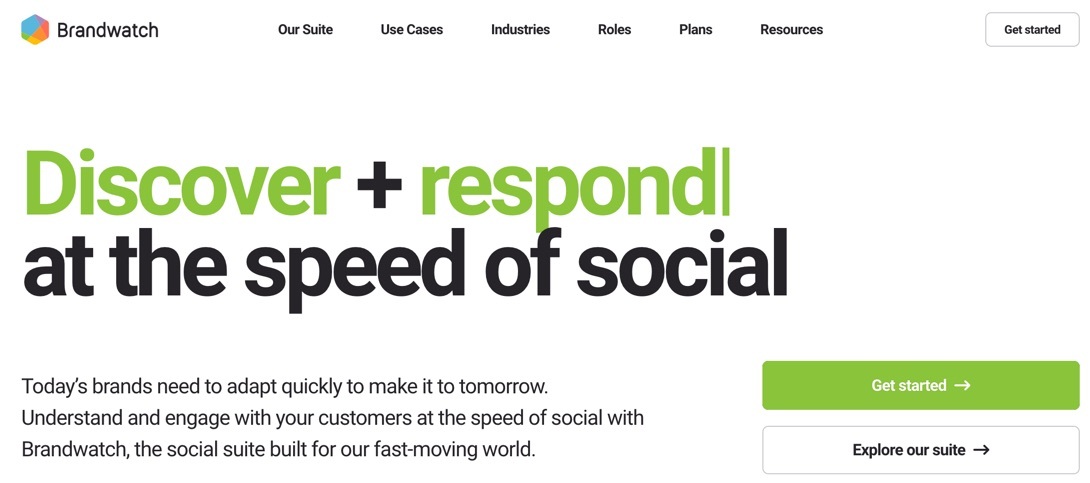
Brandwatch is a different type of tool in that it allows you to track and analyze conversations about your brand on various social media platforms, including Facebook.
This includes the ability to measure the sentiment of those mentions, so you get a feel for how your brand is perceived.
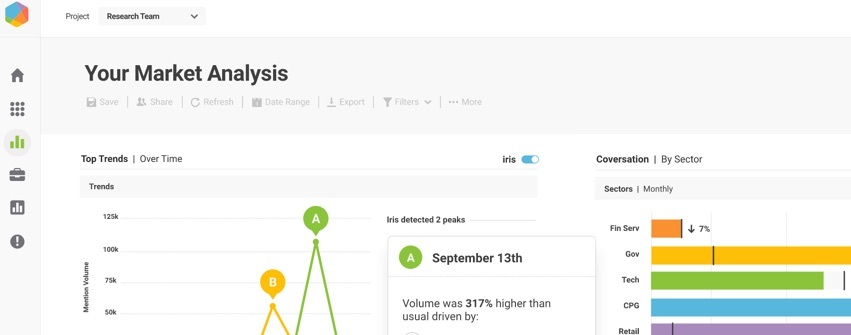
In terms of managing Facebook analytics more directly, you can still track metrics such as likes, shares and comments, see how your content performs on Facebook over time, and analyze your audience, with data such as demographics, interests and behavior.
In addition, Brandwatch can help keep track of competitors on Facebook, analyze their social media strategies, and identify areas of improvement for your own performance on the platform.
8. Quintly
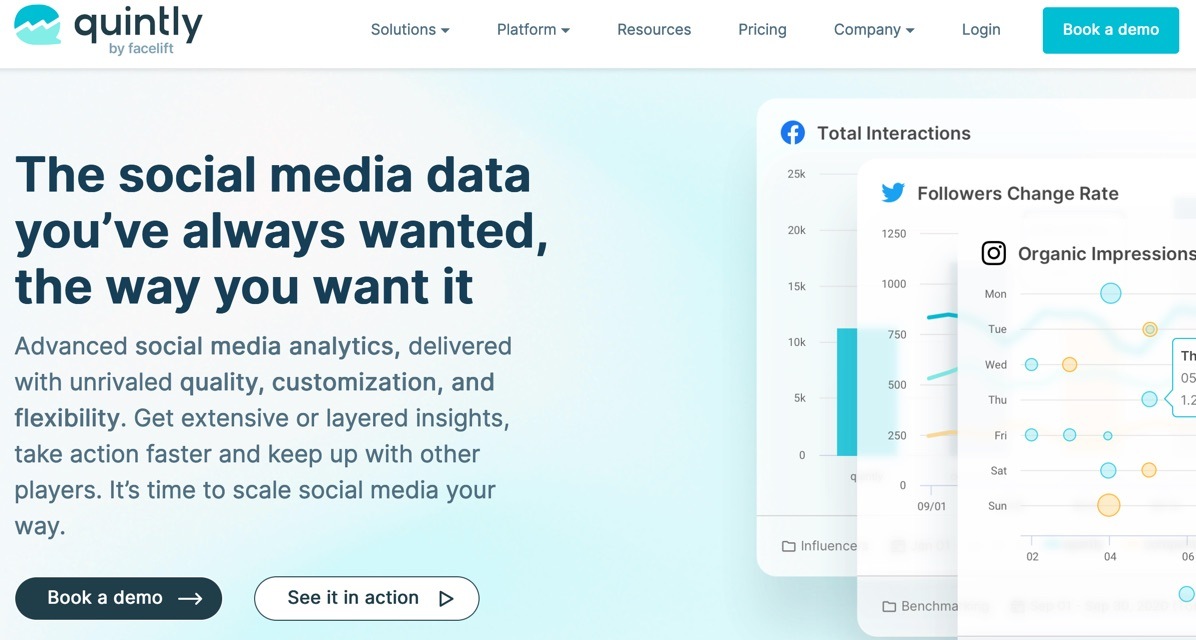
Rather than an all-in-one type social media tool as many others on this list are, Quintly’s speciality is social media analytics, enabling you to monitor data from potentially hundreds of different profiles.
They have over 700 social media metrics to choose from when building customizable dashboards and reports within the tool.
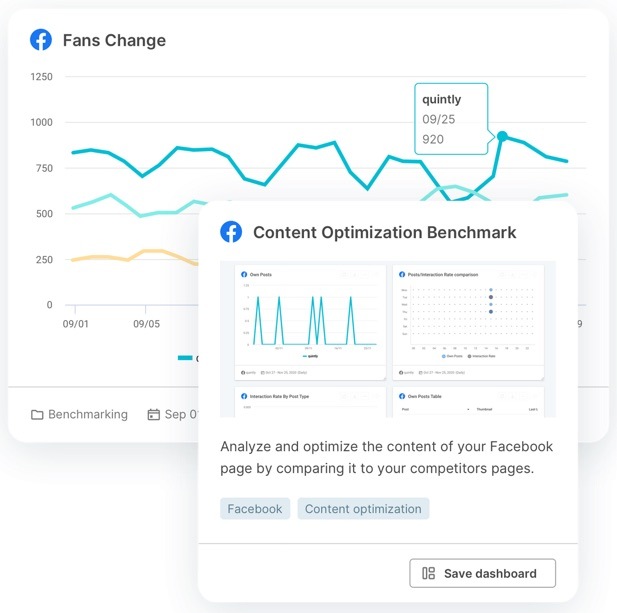
As with other tools, you can create customizable reports that can be downloaded as needed, or sent automatically on a regular schedule.
They also have an API, enabling data to be automatically retrieved and potentially integrated with other tools or stored within your own databases.
9. Buffer
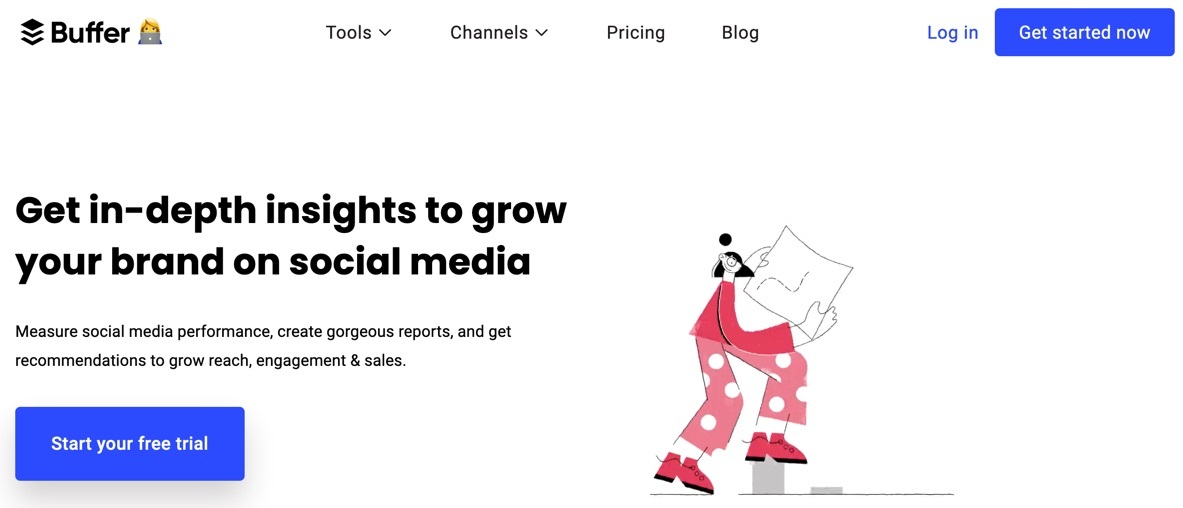
Buffer is best known as a social media scheduling tool, but also provides analytics and reporting features for Facebook and other social media platforms, indicating how posts are performing and how to potentially improve reach, engagement and other metrics.
Insights include:
- Comparisons of paid versus organic results of boosted posts…
- Analytics of posts, stories and hashtags…
- Audience demographics so you know who’s engaging with your content….
- Optimize times to post, the types of post that do best, and how frequently you should be posting.
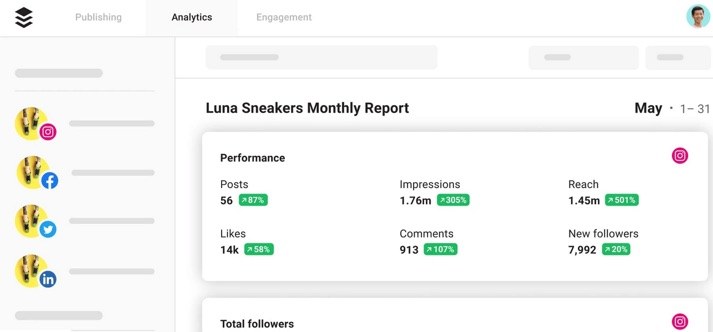
Reports can be fully customized and exported as needed, including white-labeling them, such as when working with clients.
10. Google Analytics

Google Analytics won’t help directly with analyzing data from within Facebook’s platform as with the other tools on this list, but it’s an important tool to use in conjunction with such a tool.
Using them together gives you deeper insights into how your audience is behaving, and thus how to optimize your social media strategy on Facebook accordingly.
For example, for Facebook ad campaigns, you can see exactly what happens once visitors from these campaigns arrive on your website.
Data such as the following all help to optimize your paid campaigns and inform your organic strategy, enabling you to target your audience more effectively and grow your ROI:
- Page views…
- Bounce rates…
- Conversion rates…
- How long they stay…
- The pages they visit…
- Whether they convert into a lead or a sale
Frequently Asked Questions
Why might you need a Facebook analytics tool?
Facebook analytics tools help measure what's happening and identify opportunities for improvement.
What types of data do Facebook analytics tools access?
Using a Facebook analytics tool helps you better understand your audience, measure your performance, monitor your competition, and facilitate data sharing within your team.
How can I access basic Facebook analytics for free?
You can access basic Facebook analytics, like audience demographics and post engagement, directly from your Page's Insights in the Manage Page menu.
To Conclude
Facebook analytics tools are essential if you’re looking to maximize your impact on the platform.
They give you a wealth of valuable insights, such as audience demographics, post engagement metrics, and ad performance metrics.
By keeping track of these metrics, you can fine-tune your strategy, improve their ROI, and, by keeping an eye on competitor Pages, gain competitive advantage in your niche.
Want a deeper understanding of your Facebook audience and to optimize your marketing? Facebook analytics tools are essential for maximizing your impact on the platform.Click To Post OnThe tools reviewed here give you both free and paid options, with the latter across a wide range of budgets, and provide you with a wide range of potential features, most of which include reporting, analytics, and competitor monitoring.
Whether you choose to use Facebook's in-built tools or third-party options, the insights such tools give you mean you can build a deeper understanding of your audience and optimize your marketing on Facebook.
